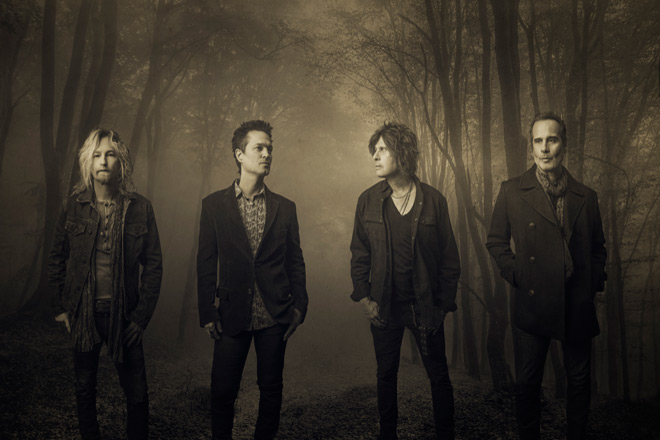
Formed in 1989, in San Diego, California, United States, Stone Temple Pilots shot to popularity as soon as Core was released in 1992—their best-selling debut record, powered by their most-recognizable, chart-topping single “Plush.” Five albums more ensued—1994’s Purple to 2010’s self-titled—still with their original vocalist, the late Scott Weiland, who died in 2015. Founders Dean DeLeo (guitar), Robert DeLeo (bass, backing vocals), and Eric Kretz (drums) soldiered on, recruiting Jeff Gutt as the new vocalist. The forthcoming offering, Perdida, will be Gutt’s second album with Stone Temple Pilots.
Scheduled for release on Friday, February 7, 2020, via Rhino Records, Perdida opens with its lead single—the countryside laments of “Fare Thee Well,” which has also a bluesy Gospel tinge to it, courtesy of Dean’s slide guitar, as well as the organ and piano melodies by guest musician Bill Appleberry and church-mode-style backing vocals by Joy Simpson and Tiffany Brown. Following next is the similarly sentimental balladry of “Three Wishes”—wistful with its delectable cornucopia of guitars. The mood then turns more somber with the throwback title track; graced with a subtle string orchestration by Yutong Sharpe (violin), Julie Staudhamaer (viola), and Erin Breene (cello), it will remind the initiated of the band’s 1996 single “Lady Picture Show.”
“I Didn’t know the Time” continues Perdida’s overall folky theme; plus ten for the beautiful guitar ad-lib and flute by Adrienne Byrne; if the term Folk Grunge has not been coined yet, then it is appropriate to use in describing the general sound of this album. Still seemingly in the same beat per minute, “Years” then further takes the listener to Stone Temple Pilots’ trip to ’70s Folk Rock; with its poignant piano parts and soulful alto-saxophone interlude by Chris Speed—absurd as this may sound—it may fit onto a playlist that includes songs by Chicago (“Saturday in the Park”) and America (“I Need You”). With “She’s My Queen,” Dean, Robert, Kretz, and Gutt then return the listener to the acoustic side of ’90s Grunge, in which the focus of the music was on the sonic innocence of the instruments and vocals instead of on the rage and angst.
Stone Temple Pilots then launch into the dirge-like, waltzy, string-laden, Post-Grunge sensibilities of “Miles Away.” The guitar then takes lead again with the dark, psychedelic sway of “You Found Yourself while Losing Your Heart,” which for a nanosecond exudes faint echoes of Stone Temple Pilots’ “Creep.” The penultimate “I Once Sat at Your Table” is one for the rustic road to Psychedelic Folk—a short guitar instrumental, preluding the textured falsetto-flavored, piano-led “Sunburst.”
Compared with Stone Temple Pilots’ other albums—both early and recent—Perdida might sound far off. However, one may consider it as the soft side of the band, and especially as the antithesis to 2018’s self-titled Blues-Grunge stomper, catching the band in its relaxed and contemplative predisposition. After all, Stone Temple Pilots, even in the time of Weiland, had never been in full-on Rock mode all the time.
Despite the shadow the death of the charismatic albeit troubled Weiland had cast on them, the remaining Stone Temple Pilots were able to rise from the tragedy. Perdida is a proof that the DeLeo brothers, Kretz, with especially Gutt are more than able to commandeer the band to where they have always set their eyes to—producing gut-wrenching and soul-piercing songs. Cryptic Rock gives Stone Temple Pilots’ seventh sign 4 out of 5 stars.





